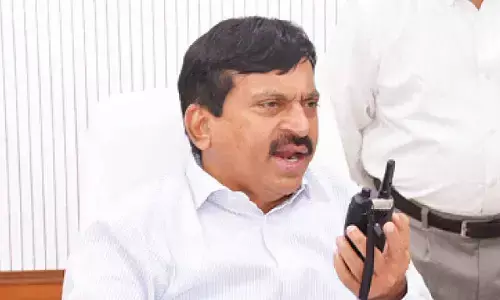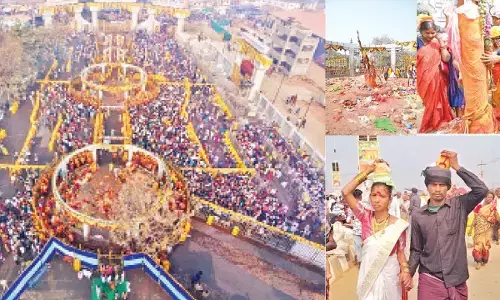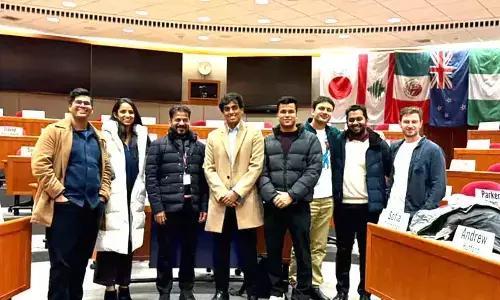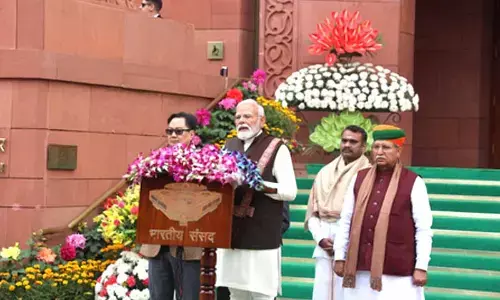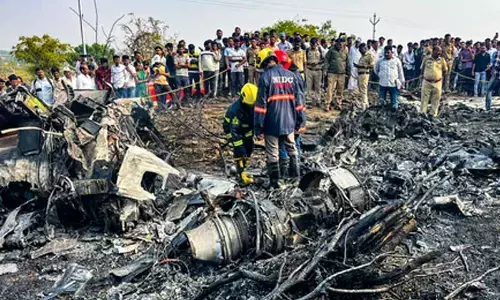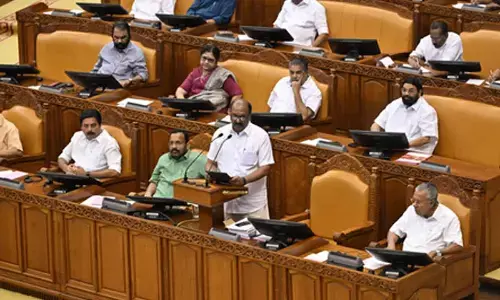Justice for sexually harassed a mirage

Justice For Sexually Harassed A Mirage, Madabhushi Sridhar, Law of Sexual Harassment. The law of sexual harassment and its practical application is not shorter than the harassment itself. With the addition of media glare, the harassment assumes serious propositions any individual or group could tolerate.
.jpg) The law of sexual harassment and its practical application is not shorter than the harassment itself. With the addition of media glare, the harassment assumes serious propositions any individual or group could tolerate. Whether it is victim of an investigative journalist as alleged or en masse victims like school girls in a train, the suffering is common and that discourages them to prosecute the culprit. Thus the latter is always at an advantage.
The law of sexual harassment and its practical application is not shorter than the harassment itself. With the addition of media glare, the harassment assumes serious propositions any individual or group could tolerate. Whether it is victim of an investigative journalist as alleged or en masse victims like school girls in a train, the suffering is common and that discourages them to prosecute the culprit. Thus the latter is always at an advantage.The news that a group of 93 school girls on train from Patna to Dhanbad were sexually harassed for more than four hours in the wee hours of November 24, 2013 was published along with the allegations against Tarun Tejpal by his own junior journalist colleague. The difference of attitude between a passenger in a train, a boss in a lift or superior in an office is absolutely nothing.
Women teachers who tried to question the sexual harassment were slapped, assaulted and silenced to suffer the trauma of perpetrators of harassment till the train reached the destination. When their reserved seats in Ganga Damodar Express had been occupied by a large group of men claiming to be examinees of the railway recruitment exam, the railway administration did not come to the rescue of victims, (if these fellows get recruited into Railways, what will happen?) their complaint was not dealt with due care and concern.
They were asked to get into train saying that men would vacate automatically. That did not happen, because such things will not happen. They automatically vacated only when they reached their station. Neither the railway police nor other administrators like ticket inspectors nor the fellow passengers came to rescue of 93 girls. Tarun Tejpal might have imposed self-suspension or resigned, will railway police and inspectors concerned be dismissed or accused be found?
Both the victims in these two cases stand on the same disadvantageous footing. The victim/complainant in Tarun Tejpal case is seeking some time from National Commission for Women to compose herself to give the statement. Tired, traumatized students and their helpless teachers of Carmel School in Dhanbad also sought time to recover from shock and collect their strength to complain.
The accused in journalist case is at least identified and available, but who knows the members in the group of accused in Dhanbad School Children case? When Railway police allows the children to be the victims of sexual harassment in the train by not acting against the illegal occupation of reserved seats, what kind of purpose would be served by a complaint given by them at a later stage? What can National Commissions of Women and Children would do, when educated accused perpetrate crime and authorities fail in checking offence?
Unlike child victims who might not know the ways of initiating process of law, the victim journalist presumably knows it, but still the problem or difficulties of complaining are same for the both. Media reported that the victim hesitated to take legal recourse. She has just reported to the Managing Editor of Tehelka. Media columns say she did not mention criminal action as she feared that it would result in ‘mud-slinging. She is aware of the possible consequence of character assassination too if the legal process is initiated.
Sexual harassment as a civil wrong was first defined by Supreme Court in Visakha case. The Supreme Court looked into the civil side of the crime. Stalking or sexual staring is the primitive or lower form of harassment, which has several aggravated forms giving rise to civil wrongs, for which compensation could be claimed, complaint to management seeking transfer of himself or accused along with compensation and criminal wrongs such as assault, causing simple or grievous hurt, insulting or outraging the modesty of woman and attempt to rape.
Visakha case deals with preliminary stages of sexual harassment and recommended mechanism to prevent its further aggravation. It took years for the Government to make and notify the law. Only after a ghastly incident like gang rape in Delhi in December 2012 happens, a criminal law of sexual harassment is made (Criminal Law (Amendment) Act, 2013) and civil law to provide civil remedies like compensation and other departmental reliefs was also made in 2013.
Law requires that allegation should be specific even before the investigation is taken up. But where was the specific law till 2013?
Though these are all of great concern, the problem lies in pre-complaint stage where the victims are dissuaded to report because of fear of consequences, character assassination, overdose of publicity, permanent stigma to the victim/s. If at all the law is set in motion the delay would be further traumatic that would even force the victims to abandon the prosecution and live in peace rather than allowing it to be shattered every day.
There is a great impediment in the civil law of Sexual Harassment. If victim/ complaint fail to prove the allegation, there is a possibility of slapping a case against her. This stops school girls or even the journalist from complaining. Another wonderful provision in civil law is provision of conciliation between victim and perpetrator. Fortunately the criminal law did not provide for it, if not marriage between the rapist and raped would have got legitimised.
The journalist and 93 school girls along with their women teachers stand in the same footing. While perpetrators are always in advantage as the fear of victims, suspected looks of society, delay and lack of concern in investigation, indifference of authorities, technicalities of lawyers who are ready to pounce with questions which would be worse than the hands of accused in the train or lift in the office and finally the decades that might be consumed for all courts including Supreme Court ultimately saying something in the name of justice. They go a long way in immunising their wrongful acts, whether criminal or civil. Added to this the trauma is the terrible glare of media!
We are talking about criminalisation, but what we should be worried is about our so-called civilisation.
Next Story








